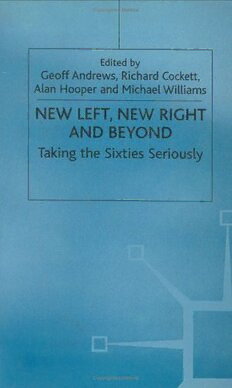
New Left, New Right, and Beyond: Taking the Sixties Seriously PDF
218 Pages·1999·0.872 MB·English
Most books are stored in the elastic cloud where traffic is expensive. For this reason, we have a limit on daily download.
Preview New Left, New Right, and Beyond: Taking the Sixties Seriously
Description:
The 1960s represented a defining turning-point in the politics and cultures of western societies. The emergence of a mass culture, the explosion of pop and new art forms, the rise of 'new-left' social movements in the wake of the events of 1968, and the first signs of a more global politics brought into question long-held assumptions. The articulation of new ideas of liberation, equality and identity and the arrival of the so-called cultural revolution combined to remake new forms of community. But what of the lasting political and cultural legacies of the sixties? In this, the first book to take the long-term legacy of the sixties seriously, the focus is on the varied and paradoxical nature of this crucial decade. Focusing mainly on the British and American context, this collection of essays brings together leading thinkers across a variety of disciplines to address a range of new perspectives on the impact of the New Left, the experience of the New Right and on how the sixties continue to influence contemporary debates on globalization and democracy. Arguing that the full implications of the 'long sixties' are still not fully realized, the book will open up new directions in the study of contemporary political ideas and movements.
See more
The list of books you might like
Most books are stored in the elastic cloud where traffic is expensive. For this reason, we have a limit on daily download.
